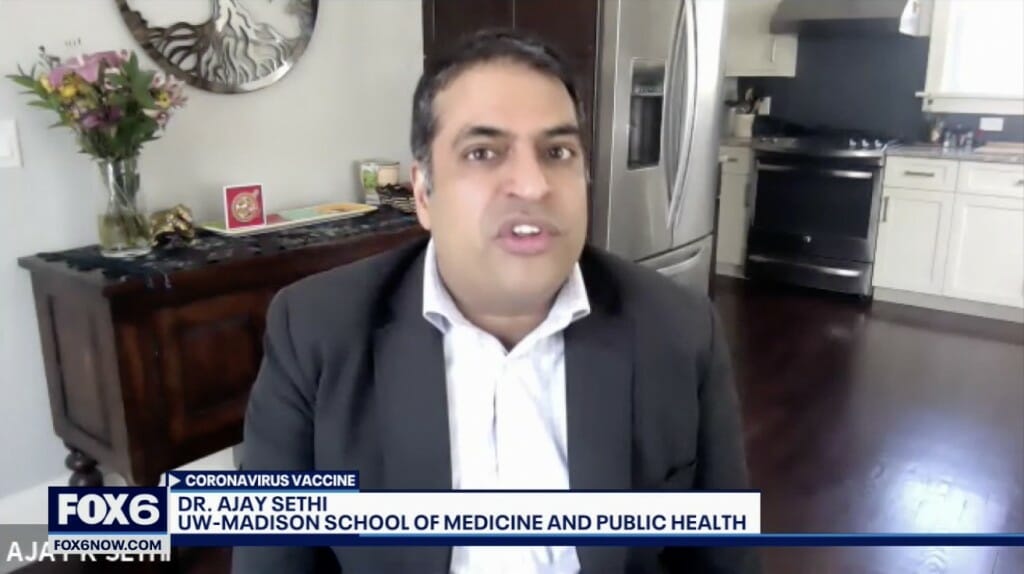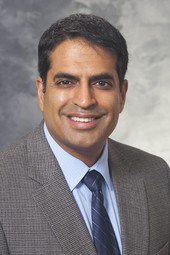300 interviews: Ajay Sethi’s pandemic pivot

Ajay Sethi is interviewed about COVID-19 by a Milwaukee TV station. He estimates that he has done about 300 media interviews since the pandemic started. Fox 6 Milwaukee
There was a time when getting calls from reporters wasn’t part of Ajay Sethi’s average day. Aside from a story about his research in 2003, the associate professor in Population Health Sciences doesn’t recall doing any interviews.
But then COVID-19 hit. Suddenly, his expertise as an epidemiologist — someone who studies patterns of diseases and factors associated with their presence — was essential. Like many UW–Madison faculty and staff, he became a frequent local and national media source — appearing in stories by NBC News, Popular Science, The Wall Street Journal, USA Today, The Washington Post, and local reporters —even as he continued teaching students about the unexpectedly timely topic of conspiracy theories in public health.
Sethi has also helped keep the UW–Madison community informed with videos like this one about campus reuniting in fall and Badger Talks episodes about the need to be wearing masks and if herd immunity is attainable.
He teaches Introduction to Epidemiology and elective courses Conspiracies in Public Health and Infectious Disease Epidemiology. Sethi received a 2021 Chancellor’s Distinguished Teaching Award, an honor given for excellence in teaching.
“It doesn’t take much to keep students engaged when you are teaching content that they immediately recognize as applicable to what they read in the news and talk about among their friends, families and colleagues,” he says.
Sethi shares what he’s learned along the way about communicating science and the importance of listening to people’s concerns.
Do you have any idea how many interviews you’ve done since the start of the pandemic?
I’ve set up Google Alerts to track the stories that come out to make sure my statements are reported accurately and are not taken out context. I’ve come across over 300 articles or news stories, so I’d say I’ve done about 300 interviews over a year and a half. There are others on campus who have done far more during the same period.
How comfortable were you doing those interviews in the beginning compared to now?
I’ve always been comfortable with the prospect of doing interviews, but I certainly started out inexperienced. I have not had any formal media training, but two people from decades ago taught me useful skills: my high school English teacher and forensics league coach (I competed in the informative speaking category) and a lawyer who prepped me for a one-time deposition. I’ve come to appreciate the wide range in styles used by interviewers. I’ve learned, and still am learning, how to quickly assess a reporter’s goals and find new ways to communicate my points while sticking to just facts.
When did you decide you wanted to become an epidemiologist?
In 1995, I was working at the NIH in an HIV vaccine lab. We wanted to know if vaccination against HIV-1 would have some protection against HIV-2 and vice versa. One of the papers I read when reviewing the literature on the subject was an epidemiological study of sex workers in Western Africa, where both HIV types circulate. I remember thinking about how I wanted to one day carry out epidemiological research that could inform, or be informed by, laboratory research.
What was it like for you getting vaccinated, when you knew all of the work that went on behind the scenes to develop a vaccine in record time?
In the case of COVID, the research has been taking place over many, many years. So, really, what was achieved in record time were the clinical trials. Operation Warp Speed invested in the production of vaccines while they were being tested. It’s amazing what can be achieved in an emergency and when people work together.
When I got vaccinated, I felt immediate relief. As my loved ones were getting vaccinated, I felt even better. As I hear stories of more people choosing to get vaccinated, particularly now that the delta variant has become a serious threat, I am hopeful. Unfortunately, it may get worse before it gets better.
While many see the speed as a triumph of science that will save lives, others remain hesitant. What would you say to get them to reconsider?
If a person’s reason for not being vaccinated yet is entirely logistical (e.g., they need help making an appointment or a ride to the clinic), I’d simply get to work and help them. If they have decided against vaccination, I probably wouldn’t attempt to get them to reconsider without first listening to what makes them hesitant, maybe even resistant. I’d want to learn what has prevented them from getting the vaccine already. I’d want to understand the emotions someone has been feeling and stay emotionally detached myself while I listen. If I sense they are open to it, I might offer some of my thoughts and ideas. If they have questions, I’ll do my best to answer them and let them know when I don’t have an answer.
My goal would not be to try to change their mind; they are perfectly capable of doing that themselves. I see my role as providing them an ear, validating their emotions and concerns, and offering them information (if asked for it) to use to decide whether they want to go ahead and get vaccinated. It may take more than one conversation, so I’d be patient. These conversations aren’t necessarily easy, particularly if it’s with a family member with whom you have a long history of disagreement.
You started teaching Conspiracies in Public Health in 2017, well before COVID-19. What led you to create the course?
I was reading the comments section that followed some online articles on a health topic. Not surprisingly, many of the exchanges rather quickly devolved into labeling, denigration and name-calling. It was a reminder that our society was becoming really polarized. Around the same time, I had read reports that some pediatricians were turning away parents who were against vaccinating their children and that some doctors would not bring up the topic of vaccines during an appointment if they thought patients were not likely to accept vaccination. I was also well aware of the extent to which misinformation was spread on the internet and over social media. I decided that I wanted to create a course that would help future practitioners (clinical and public health) understand the psychosocial basis for conspiracy thinking and feel more comfortable having difficult conversations around health topics with people who make poor decisions based on wrong information.
Why do you think people buy into conspiracy theories regarding health?
First, we must recognize that all of us are capable of conspiracy thinking whenever we are trying to reconcile something that is difficult for us to accept. This is one of the first things I teach in Conspiracies in Public Health, and I try to make a case for having empathy for anyone who goes down the path of conspiracy thinking. By conspiracy, I am referring to a situation where two or people are engaged in a secret plan to do something harmful or against your interests. Some of those situations (needing to reconcile something difficult to accept) can be highly emotional moments. We might feel angry, or embarrassed. You might experience a period of denial.
Whether it’s sports (“It’s so obvious the refs were paid off”), relationships (“I know they are cheating on me with my friend”), work (“I know that they’re working on getting me fired”), our minds might experience a period of denial as we seek out alternative explanations to what is rather difficult to accept. Situations related to our health are really no different. If anything, one might say that our health or the health of our children and loved ones might be among the harder things for us to remain detached from.
It has to be frustrating for you to see COVID conspiracy theories spread. How do you deal with that, and with stress related to the pandemic?
At times, it can be frustrating, but mostly I feel I can understand and accept it. I try to see it logically. I also exercise my mind to stay detached from things I cannot control and instead focus my energy on solutions or on something else entirely. Sometimes, all I need is a couple of hours of solitude. Also, being outside and taking my dog for a walk without my phone helps.
What has kept you saying yes to all these interviews?
I agree to the interviews because I feel that they are a part of my job — my duty — as an employee of a public institution. I only agree to do interviews where my perspective is relevant.
We all long for the days before masks and COVID-19 were part of our daily conversation. But the delta variant has been a harsh reminder that we’re not done yet. How do you get people to still take it seriously when we just want to go back to the way it was?
The fatigue is real, it’s natural to feel, and we all have felt it at times. I try to remind my family and friends — and myself — to just take things one day at a time.




